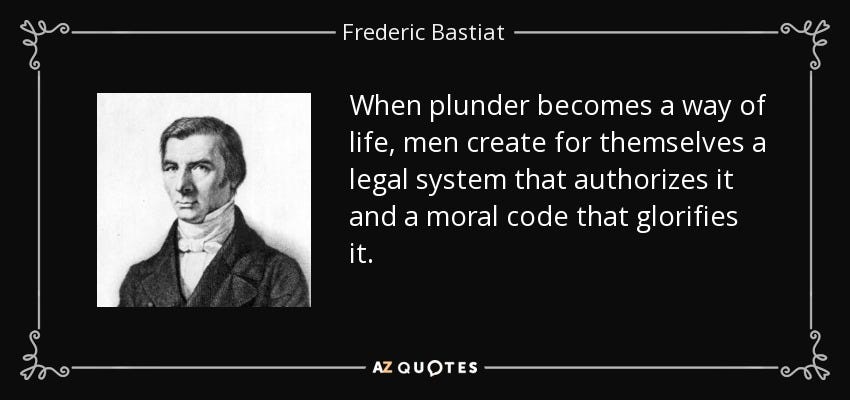Blast From the Past
History always provides answers to current questions.
I’ve been working on a post that describes the choice we face in November – and then I realized it is the same choice we face at every single election - more government with more taxes and debt or less government with lower taxation and debt. As I wrote, I began to realize my words were familiar and I had seen the same admonition before.
It was from Frédéric Bastiat’s essay “Government”.
No need to say it again when it has already been well said:
Thus, the public has two hopes, and Government makes two promises - many benefits and no taxes. Hopes and promises, which, being contradictory, can never be realized.
Now, is not this the cause of all our revolutions? For, between the Government, which lavishes promises which it is impossible to perform, and the public, which has conceived hopes which can never be realized, two classes of men interpose - the ambitious and the Utopians. It is circumstances which give these their cue. It is enough if these vassals of popularity cry out to the people: “The authorities are deceiving you; if we were in their place, we would load you with benefits and exempt you from taxes.”
And the people believe, and the people hope, and the people make a revolution!
No sooner are their friends at the head of affairs, than they are called upon to redeem their pledge. “Give us work, bread, assistance, credit, instruction, more money,” say the people; “and withal deliver us, as you promised, from the demands of the tax-gatherers.”
The new Government is no less embarrassed than the former one, for it soon finds that it is much more easy to promise than to perform. It tries to gain time, for this is necessary for maturing its vast projects. At first, it makes a few timid attempts. On one hand it institutes a little elementary instruction; on the other, it makes a little reduction in some taxes. But the contradiction is forever starting up before it; if it would be philanthropic, it must attend to its exchequer; if it neglects its exchequer, it must abstain from being philanthropic.
These two promises are for ever clashing with each other; it cannot be otherwise. To live upon credit, which is the same as exhausting the future, is certainly a present means of reconciling them: an attempt is made to do a little good now, at the expense of a great deal of harm in future. But such proceedings call forth the spectre of bankruptcy, which puts an end to credit. What is to be done then? Why, then, the new Government takes a bold step; it unites all its forces in order to maintain itself; it smothers opinion, has recourse to arbitrary measures, ridicules its former maxims, declares that it is impossible to conduct the administration except at the risk of being unpopular; in short, it proclaims itself governmental. And it is here that other candidates for popularity are waiting for it. They exhibit the same illusion, pass by the same way, obtain the same success, and are soon swallowed up in the same gulf.
…
Citizens! In all times, two political systems have been in existence, and each may be maintained by good reasons. According to one of them, Government ought to do much, but then it ought to take much. According to the other, this two-fold activity ought to be little felt. We have to choose between these two systems. But as regards the third system, which partakes of both the others, and which consists in exacting everything from Government, without giving it anything, it is chimerical, absurd, childish, contradictory, and dangerous. Those who parade it, for the sake of the pleasure of accusing all governments of weakness, and thus exposing them to your attacks, are only flattering and deceiving you, while they are deceiving themselves.
For ourselves, we consider that Government is and ought to be nothing whatever but the united power of the people, organized, not to be an instrument of oppression and mutual plunder among citizens; but, on the contrary, to secure to everyone his own, and to cause justice and security to reign.



Bastiat was a great economist who also said this in shorthand "The State is a great fiction where everyone tries to live at someone else expense"
Now I’ve put Bastiat’s essay on Government and his book, “Law,” on my reading list. We’ll talk further I’m sure.